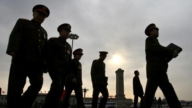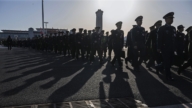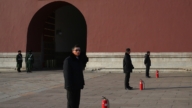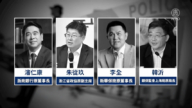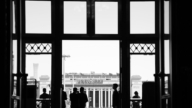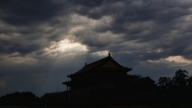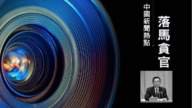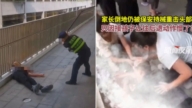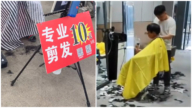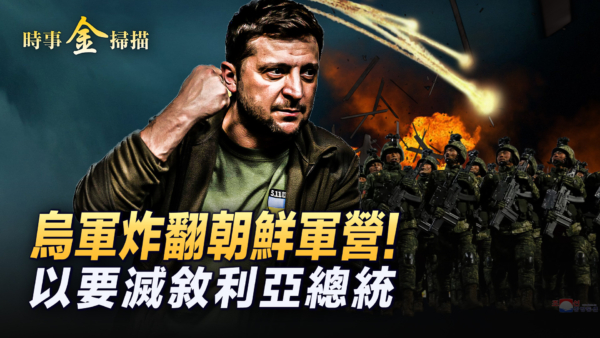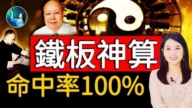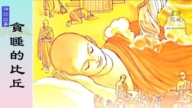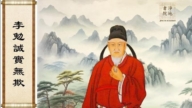【新唐人2012年9月3日讯】一份有关中共十八大高层的人事表,和政府机构改革方案的讨论稿,最近在网上流传,为前途未卜的十八大布局,再添新鲜话题。人事表中,习近平赫然列为军委主席,而讨论稿则放出重大消息说,中央打算将现有的国务院机构削减三分之一,也就是27个国务院部委缩减到18个大部委。外界认为,国务院如果作出如此罕见的大调整,很有可能是温家宝卸任前的最后一击重拳。评论同时指出,虽然是大幅度改革,但中共体制不变,任何改革也没什么实质意义。下面请看分析报导。
根据《博讯网》传出的十八大布局人事表,习近平担任新任国家主席和军委主席,李源潮兼任副主席及中央书记处第一书记,总理李克强,中纪委书记汪洋担任,此外俞正声为委员长,张德江为政协主席,王岐山为第一副总理。列入十八大政治局委员名单的包括刘延东,张高丽,孟建柱,刘源,令计划,胡春华等。
这份人事表的结果,与之前盛传的“胡锦涛连任军委主席”的消息截然不同。历史学教授,“中国社会民主党中央委员会”主持人刘因全认为,如果胡锦涛不寻求连任,说明新交接的领导班子符合胡锦涛的意愿,另外一个原因就是,胡锦涛不愿与前任军委主席江泽民一样,留下恋权的骂名。
“中国社会民主党中央委员会”主持人 刘因全:“他(胡锦涛)就是要区别江泽民,因为江泽民(以前)提出再担任军委主席,在整个国内,党内,在国际上,在以后的评论上留下了很恶劣的影响。大家对这件事情有很多批评。胡锦涛有可能接受江泽民的教训,不再连任军委主席了。”
消息人士还在海外网站上透露,国务院现有的27个部委机构将大幅度合并,事业单位根据职能,一部分转变为企业或民间团体,一部分则转变为行政机关,并入政府组成部门。如:发改委将被取消部分审批职权;科技部并入教育部;铁道部并入交通运输部;计生委与卫生部合并;港澳办与侨办并入民族事务委员会;人民银行不再属于国务院,而是独立的国家机构,与最高检、最高法平级等等。
其中对国家安全部的调整引起外界关注,国安部降格为国务院直属机构,改为国家安全总局。刘因全对此表示怀疑,他认为,中共不可能削弱国家安全部。
刘因全:“目前中共现在的体制下,为了维护自己的统治,为了强化自己的统治,为了同美国和其他国家情报方面的优势,削弱情报部门的可能性很小。”
这份大部制讨论稿声称,改革的核心是转变政府职能,以市场经济宏观调控、社会服务与管理为主。目地是要解决政府部门机构重叠、职权交叉、政出多门的矛盾,提高行政效率。外界猜测,政府高层机构这一大幅度改革,很可能是温家宝卸任前的一次大动作。
但民间舆论认为,大部制改革的意义不大。
“中国公民监政会”发起人 郭永丰:“ 中共不管他东改西改,也就是变花样,变什么花样就是换汤不换药。怎么换本质是没变,腐败分子反腐败肯定没用,怎么变有什么意义。”
“中国公民监政会”发起人郭永丰指出,中共拒绝人民的监督,不公布财产,还妄想权力代代世袭。现在老百姓也不那么傻了,再不会相信中共了。
采访/刘惠 编辑/许旻 后制/周天
Hu Jintao may not become military leader; State Council will
reduce agency number by 1/3, says unconfirmed Internet news
Recently an unconfirmed list of politburo members of
18th Congress and a draft plan of ministry reform was widely spread on the Internet,
which became another hot topic on the unsettled
personnel arrangement of the 18th Congress.
According to the list, Xi Jinping will serve as the new
Chairman of the Central Military Commission.
At the same time, the draft plan on ministry reform
revealed the State Council will reduce the number of its departments and agencies by one third, i.e. from 27 to 18.
Some outsiders speculate that such reform is possibly the
last significant move of Wen Jiabao before he steps down.
There are also remarks pointing out that there is no use
of any kind of reform if the Chinese Communist Party (CCP) regime won’t change.
According to an unconfirmed list of politburo members
of the 18th Congress by Boxun.com,
Xi Jinping will become the new President and Chairman
of the Central Military Commission.
Li Yuanchao will be the vice president and first-ranked
member of Secretariat of the CCP’s Central Committee.
Li Keqiang will be the premier and Wang Yang will be the
Secretary of the Central Commission for Discipline Inspection.
And Yu Zhengsheng will serve as
Chairman of Standing Committee,
Zhang Dejiang as Chairman of
People’s Political Consultative Conference.
Wang Qishan will be Deputy Premier of the State Council.
The list also includes Liu Yandong, Zhang Gaoli,
Meng Jianzhu, Liu Yuan, Ling Jihua, Hu Chunhua as the new politburo members of the 18th Congress.
Such personnel arrangements are completely different
from a previous prediction which said Hu Jintao will stay as Chairman of the Central Military Commission.
History professor and moderator of the Social Democratic
Party of China Central Committee Liu Yinquan believes that
Hu must be satisfied with the new CCP leader group
if he doesn’t attempt to be re-elected;
He doesn’t want a bad reputation of clinging to power
like Jiang Zemin.
(Liu Yinquan, moderator of the Social Democratic Party of
China Central Committee): “He (Hu Jintao) wants to distance
himself from Jiang Zemin who had a considerably negative
effect both inside and outside China.
Jiang insisted on staying as the military leader for another
two years. There are numerous criticisms on Jiang’s act.
Therefore Hu might learn from this and
won’t succeed himself as Chairman of the Central Military Commission.”
Some sources also revealed on foreign websites that
the State Council will merge many of the
current 27 governmental departments or agencies.
Some will become company of civil groups according
to their functions and others will be merged into other departments as an administrative body.
E.g. the National Development and Reform Commission
will lose part of its approval powers.
The Ministry of Science and Technology will be merged
into Ministry of Education,
the Ministry of Railways merged into
the Ministry of Transport,
National Population and Family Planning Commission
merged into the Ministry of Health,
the Hong Kong and Macao Affairs Office and
the Overseas Chinese Affairs Office merged into the State Ethnic Affairs Commission.
The People’s Bank of China will no longer be subject
to the State Council and
become an independent governmental agency of
the same rank as the Supreme People’s Procuratorate and the Supreme People’s Court.
Among the anticipated changes, the adjustment on the
Ministry of State Security has drawn most attention.
It will be relegated to a department affiliated to
the State Council as “State General Administration of State Security”.
Liu Yinquan casts doubt on such prediction because he
doesn’t believe that the CCP would weaken the ministry.
(Liu Yinquan):”Under the current CCP’s regime,
it will try its best to strengthen its governance and hold its power.
To compete with the United States and other countries, it is
not possible for it to weaken the intelligence department.”
A discussion draft on such super ministry reform
claimed that
the reform mainly aimed at making governmental
functions focus more on social service and
administration and macroeconomic control
on the market economy.
The reform will try to solve the problem of power
overlapping between different governmental departments and agencies and enhance administrative efficacy.
It is speculated this reform may be the last significant
move of Wen Jiabao before he leaves.
However, many civilians said they wouldn’t expect
much from the reform.
(Guo Yongfeng, founder of Chinese Citizen Monitoring
Association):”Whatever kind of reforms the CCP carries out,
they are all superficial which will never change its evil nature.
Corruptionists will never really suppress corruptions
so there is no use to all those changes.”
Guo Yongfeng remarked that the CCP leaders
had refused to be monitored by the Chinese people or declare their wealth;
they even attempted to pass the power
to their descendants generation after generation.
However, the good news is that many Chinese civilians
have been awakened and refused to trust the CCP anymore.


